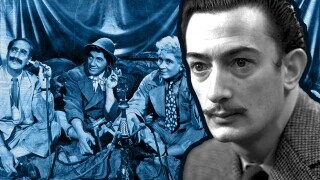The Surrealist Marx Brothers/Salvador Dali Comedy That Never Was

Over the years, we’ve talked a lot about the great movie comedies that 100 percent totally exist. But since we don’t want to appear biased against films that were never actually made, let’s take a deep dive into one of the most epic, challenging, bizarre comedies of Hollywood’s golden age that went completely unproduced: Giraffes on Horseback Salad, the legendary near-collaboration between surrealist master Salvador Dali and comedy icons the Marx Brothers.
Yes, famed painter (and hair salesman) Dali once wrote a movie for the Marxes, which may seem odd, but in many ways, makes total sense. Dali was the face of the surrealist art movement, and Marx Brothers comedies were powered by an unrelenting anarchic absurdity. While the films were always visually grounded, set in some version of the real world, the Marxes themselves operated within their own universe of uncanny logic.
Don't Miss
Dali was, perhaps unsurprisingly, most enthralled with Harpo, the silent Marx brother whose pockets were infinite in their depth and who, in one particularly surreal gag, seemingly had a live miniature dog living inside of his torso.
According to Harpo's son, Bill Marx, Dali felt that Harpo “in both the visual and visceral sense, was the ultimate depiction of Surrealism.” Groucho claimed that Dali “was in love with my brother — in a nice way.” Dali was such a Harpo stan that after they briefly met in Paris in 1936, he sent the comedian a gift: a harp “with barbed-wire strings, strung with spoons” (which Harpo’s wife forbade him from actually attempting to play).
Dali’s admiration for Harpo inspired him to begin work on a movie idea, dubbed Giraffes on Horseback Salad, penning an extended outline that focused on Harpo but also included parts for his brothers. The handwritten outline – which, incidentally, was “illustrated with doodles of nude women with huge nipples” and “an erect penis growing flowers” — concerns “Jimmy, a young Spanish aristocrat living in America because of political circumstances in his own country” (to be played by Harpo) who wants to leave his fiancee for a mysterious “Surrealist Woman” whose face is never seen in full.
Judging from what’s been published of the script, it would have been pretty goddamn strange, even by the Marx Brothers’ standards. At one point, Dali writes, “Groucho asks his brothers to fetch a herd of goats, a dead ox, a 60-foot long bed, trombones with fair hair, platinum blonde beauty queens” — and it goes on like that. Other scenes feature “burning giraffes wearing gas masks" and "Harpo catching dwarves with a butterfly net.” Not to mention Dali’s accompanying sketches, which included a rendering of Groucho as some kind of Hindu God telephone operator.

National Museum of American History
Harpo and Dali brought the project to MGM, even meeting with studio head Louis B. Mayer. According to Dali, his pitch began by proclaiming, “I see Harpo battling a lively crayfish that jumps in a pan of boiling water to protect himself. Harpo opens an umbrella, and a chicken explodes on all the onlookers. He looks at all of the chicken pieces dispersed everywhere and puts each piece carefully on a saddle that he uses as a plate… a saddle not for a horse… but for a giraffe!” Shockingly, MGM didn’t bite.
But while many of his ideas may have been wildly impractical, Dali’s vision, inspired by Cecil B. DeMille’s Hollywood epics, was undeniably impressive, stoking the curiosity of Marx Brothers fans for decades. Although Dali’s full outline was thought lost, in the 1990s, the Elevator Repair Service theater group mounted a production of Giraffes on Horseback Salad using what material was available at the time and plugging in the gaps with “imaginings of awkward domestic encounters” between Dali and Harpo.
Eventually, writer Josh Frank managed to track down Dali’s complete work and adapted it into a comic book in 2019 with the help of Tim Heidecker, who obviously has some experience in the “what the f**k am I watching?” humor department. He’s also a leading authority on the Marx Brothers, as this clip from On Cinema conclusively proves:
The graphic novel really captures the boldness (and arguably, the commercially-poisonous formlessness) of Dali’s story ideas, giving us at least some sense of what the movie might have been like had it been made by MGM in the 1930s.

Quirk Books
Impressively, Frank even commissioned an accompanying soundtrack featuring Marx Brother impressionists to fulfill the musical quotient of the imaginary movie.
Had Giraffes on Horseback Salad been made, it very likely would have been deemed a failure — but it certainly would have been one of the most visually-striking, spectacular wild-swing failures in the history of comedy.
You (yes, you) should follow JM on Twitter (if it still exists by the time you’re reading this).